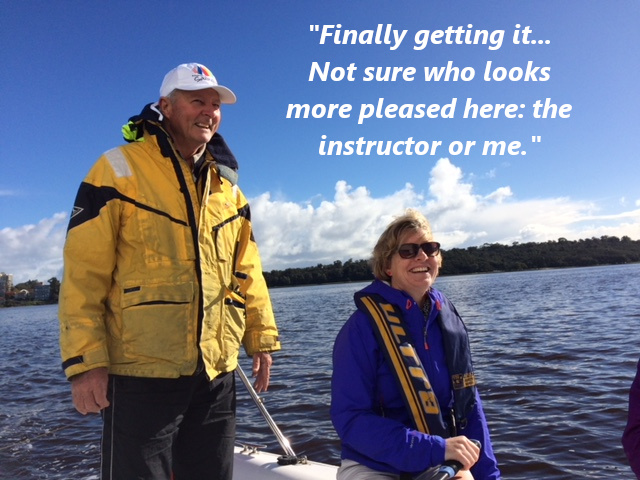Sailing into the blue: Losing yourself to gain new focus as a teacher

Gemma Clarke reflects on what it’s like to put yourself into the shoes of a student again in order to become a better teacher – something which all teachers participating in courses may experience.
I have been a teacher for about 20 years now and I love what I do. I consider myself pretty good at keeping up to date with my professional learning and being on top of the rapidly changing educational landscape. I feel comfortable in the classroom and working across the wider academic space.
When I am in the classroom, building rapport with my students is a priority because my students are almost all at risk in one form or another. I have developed strategies over the years to achieve rapport and establish connections. And, I consider the fact that I was not exactly the most stellar student myself in school to be an advantage in terms of giving me insight into the challenges of being a student. However, a recent decision to learn new skills put me firmly back in the shoes of being a student and boy, do I have a lot to remember about what it really feels like to be a student.
Last year I decided to challenge myself to learn new things outside of my professional career space, so I signed up to learn how to sail yachts and play bridge. I can honestly say both were extremely rewarding experiences on many levels. But I can also say that there were many times when it was challenging, frustrating and humbling.
I remember one moment in particular that encompassed all these feelings. We were practicing man overboard manoeuvres and it was my task to pull the ‘man’ from the water at exactly the right time. Everyone in the team was focussed on doing their individual task to ensure a safe retrieval. My task was to haul the ‘man’ (we used a heavy floating drum wrapped in a life jacket) from the water at exactly the right moment.
Fortunately, on first pass I managed the task of getting him overboard, only to have the instructor roaring to put him “between the mainsheets”. Well under pressure, my brain just went blank! Even though the instruction was given in English, a language I like to think I am fairly fluent in, I could not process the instruction fast enough. Those seconds of uncertainty while my brain ran through all the possibilities of meaning until it made the correct connection, only resulted in more roaring feedback from the instructor because I was letting the team down and taking too long.
I felt a huge mixture of emotions and I remember my overwhelming desire at the time was to get off the yacht and push the teacher in the water on my exit. But, I didn’t. That experience and many other similar ones over the 8-week course really taught me a lot about being a student again.
I have come away from my experience with a completely different perspective about how long it takes to learn things, about the challenges of language development, about the stress of tests and assessment, about how working in teams can be very confronting, and about the absolute importance of not being dismissive of failure like it isn’t a confronting experience.
I cannot emphasise enough how important I think it is, if you are a teacher or interact with students in any way, to find an opportunity to be a student again yourself – to really put yourself in a position where you don’t have all the power and the answers, where you are reliant on the teacher and your peers. Think of it as a kind of pre-tech virtual reality experience.
The benefits of this experience for me have been greater levels of patience, creating more opportunities for repetition when teaching new concepts, providing more formative feedback, being more mindful about how my students react to feedback, and celebrating when they grasp new concepts and achieve success.
To continue the conversation, contact Gemma Clarke, or share your thoughts and ideas via Yammer, Twitter or LinkedIn.


